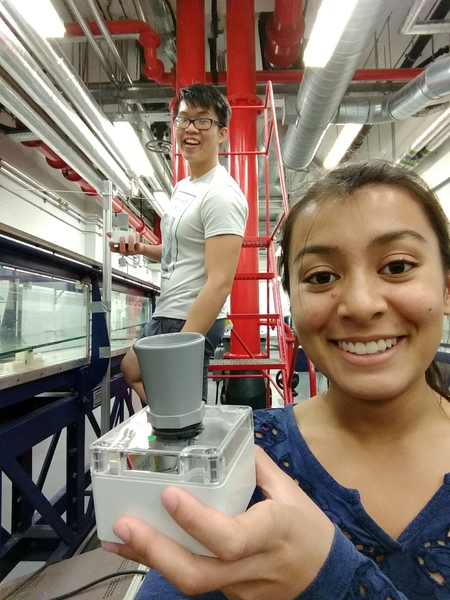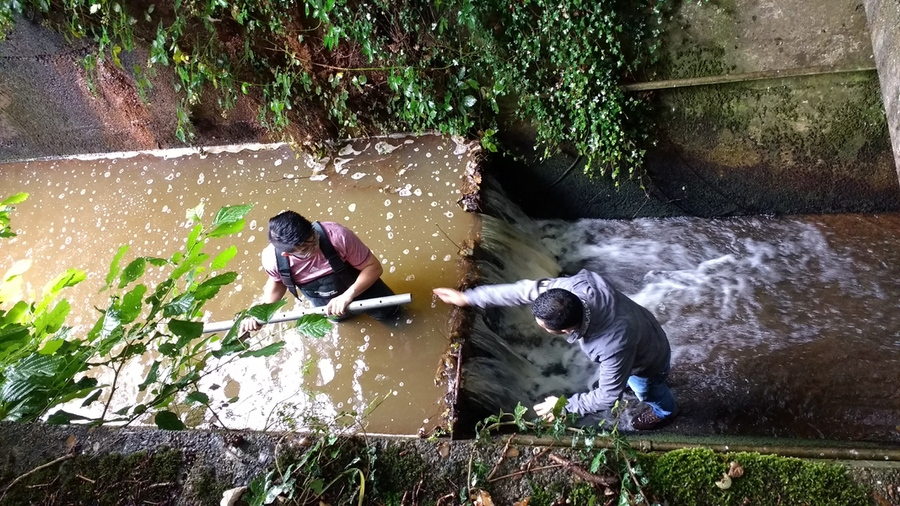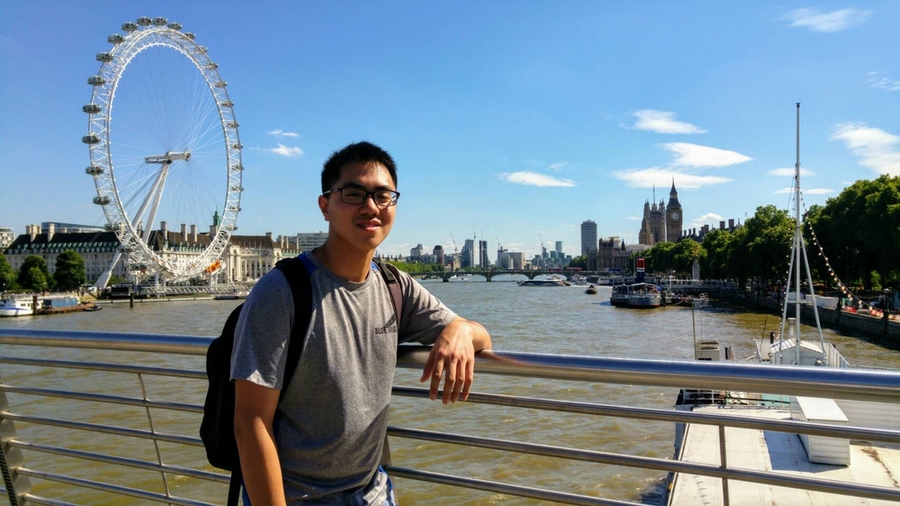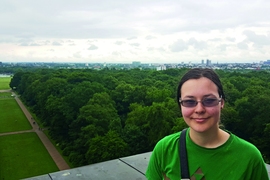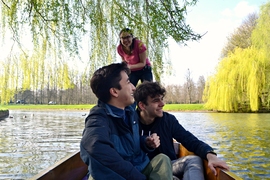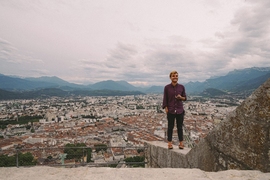Building on the success of existing partnerships, MIT’s Global Education and Career Development (GECD) is significantly expanding its academic exchange with Imperial College London, while continuing to grow the Imperial summer research exchange. Twelve MIT departments will now take part in one or both exchanges.
These augmented multidepartmental exchange programs will allow even more MIT undergraduates to participate in rigorous and enriching study abroad and research experiences at Imperial, a leading U.K. university that focuses exclusively on science, engineering, medicine, and business.
The academic exchange is transforming from a departmental exchange spanning two departments to a multidepartmental exchange involving nine departments. GECD will start sending students on the expanded academic exchange program this coming fall.
Meanwhile, the summer research exchange with Imperial has been growing steadily, from two departments in 2013 to 10 now.
“Such opportunities provide hugely valuable experiences in learning to learn and work in another culture and a different scientific environment,” says Professor Linn Hobbs of the MIT Department of Materials Science and Engineering. “Students find the experience challenging, exciting, and full of potential for both personal and intellectual growth."
“MIT and Imperial students are ambitious, innovative and thrive in academically rigorous environments," adds Professor Maggie Dallman, Vice President (International) at Imperial College London. "Students on this program will be exposed to unparalleled education and research opportunities. Above all, they will learn from each other and from experiencing new academic and cultural environments. We are thrilled to be sharing new thinking and challenges with colleagues across so many departments at both universities.”
MIT’s partnership with Imperial began in 2013 with a summer research program for students from both schools’ departments of Materials Science and Physics. Hobbs spearheaded the exchange, working closely with Robin Grimes, professor of materials physics at Imperial and chief scientific advisor to the U.K.
Hobbs was also the impetus behind the academic exchange program that shortly followed, and has championed the development of both exchange programs. As part of the academic exchange, a corresponding number of Imperial students come to MIT to partake in courses and research.
Semester/year academic exchange
The academic exchange program offers the opportunity for two juniors each (four in the case of Electrical Engineering and Computer Science) from nine departments to spend either the spring semester of their junior year or their full junior year in the corresponding department at Imperial College London. Students apply through GECD and are selected jointly by faculty in their MIT department and GECD’s Global Education staff.
While on the exchange, students study on Imperial’s campus, which is located in central London’s posh Kensington and Chelsea neighborhoods steps away from such cultural attractions as the Science and Industry Museum, Royal Albert Hall, and numerous music and restaurant venues. Students take academic subjects that provide MIT transfer credit for core or restricted-elected subjects in their majors. In addition, Imperial offers UROP-like experiences whenever possible.
The 2019 academic year will initiate a two-year pilot for the expanded exchange that will enable student participation from seven new departments. These new departments, joining Materials Science and Engineering and Nuclear Science and Engineering, are: Mechanical Engineering; Chemistry; Electrical Engineering and Computer Science; Chemical Engineering; Earth, Atmospheric and Planetary Sciences; Aeronautics and Astronautics; and Mathematics.
Faculty as well as students are enthusiastic about the multidepartmental expansion. “We are excited to be initiating a student exchange with Imperial College London, one of the great research institutions of the world,” says Professor Haynes Miller in the Department of Mathematics. “Imperial has an excellent undergraduate program, one that will offer our students the same kind of perspective and growth that the Cambridge-MIT Exchange did. Thirty-seven of our majors spent a year as Cambridge students over the 16 years of the program. Each and every one gained from it in deep ways, and we anticipate the same results from the Imperial project. We look forward also to hosting an equal number of Imperial students here; their different perspectives will enrich the experience of our majors here in Cambridge, Massachusetts.”
Summer research exchange
Since its launch in 2013, the summer research exchange with Imperial has added new departments over the years and welcomed increasing numbers of participants. The research exchange is now open to undergraduates in Civil and Environmental Engineering, Materials Science and Engineering, Chemistry, Electrical Engineering and Computer Science, Physics, Chemical Engineering, Aeronautics and Astronautics, Mathematics, Biological Engineering, and Nuclear Science and Engineering. Each department nominates two students to participate each year. The faculty coordinators then work closely with their counterparts at Imperial to identify labs, faculty supervisors, and advisors for participating students.
The research exchange runs from late June through mid-August. During those weeks, MIT also welcomes Imperial students to its campus. Last summer, 18 MIT students and 18 Imperial students participated in the exchange, including rising MIT junior Yun Chang. Chang, an AeroAstro major who is also an Emerson fellow in piano, immersed himself in his lab’s research on quadrocopter 3-D SLAM implementation, savored the cosmopolitan world of London and Imperial, and attended numerous BBC classical music promenade concerts.
“Doing research at Imperial College London was an amazing experience, and was especially unique in that I got to meet people from all over the world,” says Chang. “I got to do interesting research, and I was able to broaden my horizons. I am already missing walking through Kensington Gardens on my way to Imperial every morning.”
MIT’s UROP office is an integral partner with GECD’s Global Education team for this program. As a co-sponsor, UROP provides student funding through hourly wages and an airfare stipend, while GECD funds MIT students’ accommodations in London.
Looking forward to future collaboration
“MIT is looking forward to a long-term partnership with Imperial College London,” says Julie Maddox, assistant dean for Global Education at GECD. “I’ve seen students profiting from their academic and research experiences at Imperial over the years and have been inspired by how they speak about their intellectual and personal growth. Likewise, Imperial students who come to our campus greatly contribute to our classes and labs and are enthusiastic about their experiences here.”
“I’m thrilled that we succeeded in growing both the academic and research exchanges with Imperial so more students from across MIT will be able to engage in these important opportunities,” adds Malgorzata Hedderick, associate dean for Global Education at GECD. “Imperial has been a very supportive partner over the years and we are excited to continue this mutually beneficial relationship. Huge thanks go to the MIT and Imperial faculty; none of this would have been possible without their leadership, dedication, and involvement.”
